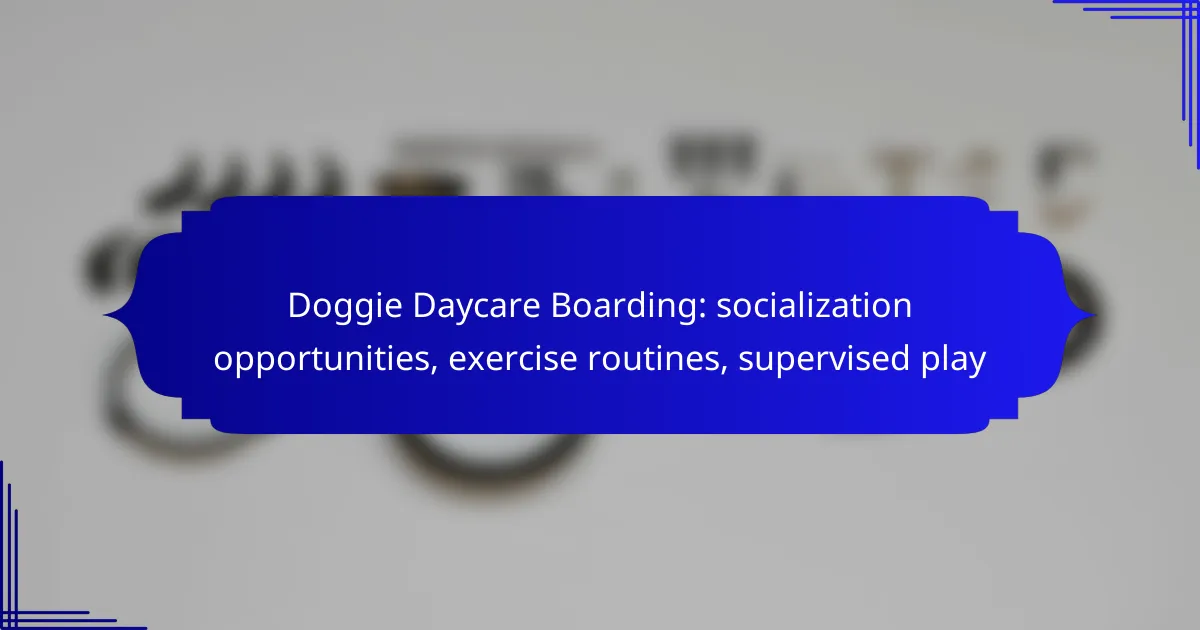Doggie daycare in Australia provides a valuable environment for dogs to thrive through enhanced socialization, tailored exercise routines, and supervised play. By allowing dogs to interact with their peers in a structured setting, these facilities foster positive behaviors and essential social skills. Additionally, a variety of engaging activities ensures that each dog remains active and stimulated throughout the day, contributing to their overall well-being.

What are the benefits of doggie daycare in Australia?
Doggie daycare in Australia offers numerous advantages, including enhanced socialization, improved exercise routines, and supervised playtime. These benefits contribute to a dog’s overall well-being and can help reduce behavioral issues.
Enhanced socialization opportunities
Doggie daycare provides an ideal environment for dogs to interact with other pets, which is crucial for their social development. Regular exposure to different breeds and temperaments helps dogs learn appropriate behaviors and communication skills.
In a daycare setting, dogs can engage in group activities that promote friendly interactions. This socialization can lead to improved confidence and reduced anxiety when encountering new situations outside the daycare.
Improved exercise routines
Daily exercise is vital for a dog’s physical health, and doggie daycare typically includes structured play sessions that keep dogs active. Activities may range from running in a secure yard to participating in agility courses, ensuring dogs receive adequate physical stimulation.
Regular exercise helps maintain a healthy weight and can prevent obesity-related issues. A good daycare will tailor exercise routines to suit different energy levels and breeds, making it essential to choose a facility that understands your dog’s specific needs.
Supervised playtime
Supervised playtime is a key feature of doggie daycare, ensuring that dogs interact safely under the watchful eye of trained staff. This supervision helps prevent conflicts and allows for immediate intervention if any issues arise during play.
Facilities often implement structured playgroups based on size and temperament, which enhances safety and enjoyment. Owners should look for daycares that prioritize supervision and have clear protocols for managing playtime dynamics.

How does doggie daycare promote socialization?
Doggie daycare promotes socialization by providing a structured environment where dogs can interact with each other and experience new situations. This setting encourages positive behaviors and helps dogs develop essential social skills.
Interaction with other dogs
At doggie daycare, dogs have the opportunity to engage with a variety of other dogs, which is crucial for their social development. Regular interaction helps them learn how to communicate effectively, understand body language, and establish their social hierarchy.
Supervised playtime is typically organized to ensure safety and compatibility among dogs. Caregivers often group dogs by size, temperament, and energy levels, allowing for a more enjoyable experience. This structured interaction can reduce anxiety and improve overall behavior in social settings.
Exposure to various environments
Doggie daycare exposes dogs to different environments, which can help them adapt to various stimuli. This exposure includes sounds, smells, and sights that they may not encounter in a typical home setting, promoting confidence and reducing fearfulness.
For example, a dog may experience the hustle and bustle of a busy daycare facility, which can help them become more comfortable in crowded places. Regular visits to daycare can also prepare dogs for other social situations, such as trips to the park or vet visits, making these experiences less stressful.

What exercise routines are offered at doggie daycare?
Doggie daycare facilities typically offer a variety of exercise routines designed to keep dogs active and engaged throughout the day. These routines often include structured play sessions and outdoor activities, ensuring that dogs receive both physical exercise and socialization opportunities.
Structured play sessions
Structured play sessions are organized activities that allow dogs to interact with each other under supervision. These sessions often include games like fetch, tug-of-war, and obstacle courses, which help to stimulate both their minds and bodies.
During structured play, staff members closely monitor the dogs to ensure safe interactions and to manage any behavioral issues that may arise. This supervision helps maintain a positive environment where dogs can learn social skills and develop friendships.
Outdoor activities and walks
Outdoor activities and walks are essential components of a doggie daycare’s exercise routine, providing dogs with fresh air and the chance to explore different environments. Many facilities take dogs on regular walks, allowing them to experience new sights and smells while getting their daily exercise.
In addition to walks, some daycares offer playtime in secure outdoor areas where dogs can run freely and engage in group games. This combination of structured outdoor play and exploration helps to keep dogs physically fit and mentally stimulated.

How is play supervised in doggie daycare?
Play in doggie daycare is closely monitored to ensure the safety and well-being of all dogs. Trained staff oversee interactions, providing a structured environment that promotes healthy socialization and exercise.
Trained staff monitoring
Doggie daycare facilities employ trained staff who specialize in canine behavior and safety. These professionals observe playgroups to ensure that dogs interact positively and intervene if any issues arise. Staff-to-dog ratios typically range from 1:5 to 1:10, allowing adequate supervision.
Regular training sessions for staff help them recognize signs of stress or aggression, enabling them to manage play effectively. This proactive approach fosters a safe and enjoyable environment for all dogs involved.
Safety protocols in place
Safety protocols are essential in doggie daycare settings to minimize risks. Facilities often require vaccinations and health checks before dogs can participate, ensuring that all dogs are healthy and protected against common diseases.
Additionally, play areas are designed with safety in mind, featuring secure fencing and non-toxic materials. Emergency procedures are established, and staff are trained to handle various situations, from minor injuries to behavioral conflicts, ensuring a quick and effective response.

What should you look for in a doggie daycare?
When choosing a doggie daycare, prioritize socialization opportunities, exercise routines, and supervised play to ensure your pet’s well-being. A quality facility will provide a safe environment where dogs can interact, exercise, and receive proper care from trained staff.
Facility cleanliness and safety
Cleanliness and safety are paramount in a doggie daycare. Look for facilities that maintain high hygiene standards, including regular cleaning of play areas and sleeping quarters. Check for secure fencing, non-toxic materials, and proper ventilation to ensure a safe environment for your dog.
Inspect the facility for any potential hazards, such as sharp objects or toxic plants. A well-maintained daycare should have clear emergency procedures and protocols in place, including first aid measures for injuries or health issues.
Staff qualifications and experience
Qualified and experienced staff are essential for a positive doggie daycare experience. Look for caregivers who have training in animal behavior, first aid, and dog handling. Staff should be knowledgeable about different breeds and their specific needs.
Ask about the staff-to-dog ratio, as a lower ratio often means more individualized attention for each dog. Inquire about ongoing training and how the staff handles behavioral issues or emergencies. A well-trained team can significantly enhance your dog’s socialization and safety during their stay.

How do doggie daycare costs vary in Australia?
Doggie daycare costs in Australia can differ significantly based on factors like location, services offered, and duration of care. Generally, you can expect to pay anywhere from AUD 30 to AUD 80 per day, with variations based on the specific needs of your pet.
Pricing models by location
In Australia, doggie daycare pricing models can vary widely depending on the city or region. Major urban centers like Sydney and Melbourne tend to have higher rates compared to rural areas. For instance, a daycare in Sydney might charge around AUD 50 to AUD 80 per day, while a facility in a smaller town could range from AUD 30 to AUD 50.
Additionally, some facilities offer tiered pricing based on the services provided, such as grooming or training. It’s essential to compare local options to find the best fit for your budget and your dog’s needs.
Daily vs. monthly rates
Doggie daycare facilities often provide both daily and monthly rates, which can influence your overall costs. Daily rates are suitable for occasional care, while monthly packages typically offer a discount for regular attendance. For example, a monthly package might cost around AUD 600 to AUD 1,200, depending on the number of days included.
When considering which option to choose, evaluate your dog’s socialization needs and your schedule. If your dog benefits from daily interaction, a monthly plan can be more economical. Always inquire about any additional fees for services like pick-up and drop-off, as these can affect the total cost.
